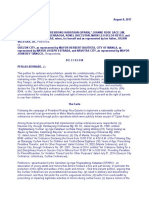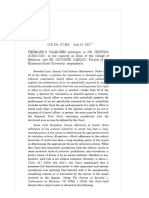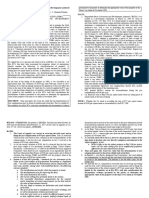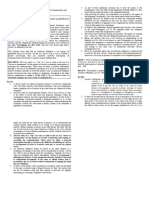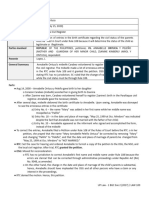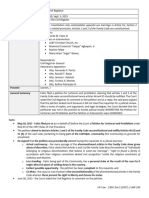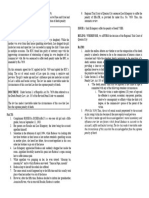Samahan NG Mga Progresibong Kabataan (SPARK) V QC
Samahan NG Mga Progresibong Kabataan (SPARK) V QC
Uploaded by
Rukmini Dasi Rosemary GuevaraCopyright:
Available Formats
Samahan NG Mga Progresibong Kabataan (SPARK) V QC
Samahan NG Mga Progresibong Kabataan (SPARK) V QC
Uploaded by
Rukmini Dasi Rosemary GuevaraOriginal Title
Copyright
Available Formats
Share this document
Did you find this document useful?
Is this content inappropriate?
Copyright:
Available Formats
Samahan NG Mga Progresibong Kabataan (SPARK) V QC
Samahan NG Mga Progresibong Kabataan (SPARK) V QC
Uploaded by
Rukmini Dasi Rosemary GuevaraCopyright:
Available Formats
SPARK v. QC Prescribing penalties therefore; and for other purposes, dtd. Oct.
August 8, 2017 | Perlas-Bernabe, J. | Police Power 14, 2002
c. Quezon City, through Ordinance No. SP-2301 Series of 2014 “An
PETITIONER: Samahan ng mga Progresibong Kabataan (SPARK), et al. Ordinance Setting for Disciplinary Hours in Quezon City for
RESPONDENTS: Quezon City, City of Manila, and Navotas City Minors from 10PM to 5AM
3. Petitioners filed petition to argue that the Curfew Ordinances are
SUMMARY: This is a petition for certiorari and prohibition assails the unconstitutional because it
constitutionality of the curfew ordinances issued by the local governments of a. Result in arbitrary and discriminatory enforcement, thus fall under
Quezon City, Manila, and Navotas. Petition prays for the mayors of the the void for vagueness doctrine;
respective local governments to prohibit, refrain and desist from implementing b. Suffer from overbreadth by proscribing or impairing legitimate
and enforces its issuances pending resolution of this case, and declare Manila activities of minors during curfew hours;
City’s ordinance as ultra vires for being contrary to Juvenile Justice and c. Deprive minors of the right to liberty and the right to travel without
Welfare Act and all curfew ordinances as unconstitutional for being violative of substantive due process
the right of minors to travel as well as the right of parents to rear their children. d. Deprive parents of their natural and primary right in rearing the
SC upheld the validity of Quezon City Ordinance while rendering the Navotas youth without substantive due process.
and Manila City null and void. It used strict scrutiny test to determine the 4. Petitioners specifically posit that the Curfew Ordinances:
reasonability of classifications considering that the right to travel is a a. Encourage arbitrary and discriminatory enforcement as there are
fundamental right in our legal system. As to the Quezon City Ordinance’s no clear provisions on how law enforces should apprehend and
validity using the scrutiny test, it passed both tests. Its provisions uphold the properly determine the age of the alleged curfew violators
right of association by enabling minors to attend both official and extra- b. The law enforcer’s apprehension depends only on his physical
curricular activities not only of their school or church but also of other assessment, and are subjective only on the law enforcer’s visual
legitimate organizations. The rights to peaceably assemble and of free assessment of the alleged curfew violator.
expression are also covered by these items given that the minors' attendance in c. Further argue that the prohibition of minors on streets during
the official activities of civic or religious organizations are allowed during the curfew hours will not per se protect and promote the social and
curfew hours. moral welfare of children of the community.
d. Manila Ordinance contravenes Sec. 57-A of R.A 9344 given that
DOCTRINE: The State may impose limitations on the exercise of this right, the cited curfew provision imposes on minors the penalties of
provided that they: (1) serve the interest of national security, public safety, or imprisonment, reprimand and admonition.
public health; and (2) are provided by law. 5. Lastly, petitioners submit that there is no compelling State interest to
While rights may be restricted, the restrictions must be minimal or only to the impose curfews contrary to the parents’ prerogative to impose them in the
extent necessary to achieve the purpose or to address the State's compelling exercise of natural and primary right in the rearing of the youth, and even if
interest. Thus, in the present case, each of the ordinances must be narrowly a compelling interest exists, less restrictive means are available to achieve
tailored as to ensure minimal constraint not only on the minors' right to travel the same.
but also on their other constitutional rights.
ISSUE/s:
FACTS: 1. WoN the Curfew Ordinances are unconstitutional – YES (Manila and
1. Following Pres. Rodrigo Duterte’s campaign to implement nationwide Navotas) & No (for QC)
curfew for minors, several Metro Manila local governments started to
strictly implement their curfew ordinances publicly known as “Oplan RULING: Wherefore, the Petition is partly granted. Only the Quezon City
Rody”. Ordinance is Constitutional and valid. Ordinance No. 8046 (City of Manila), and
2. The following respondents implemented curfew ordinances: Pambayang Ordinansa Blg. 99-02, as amended by P.O. Blg. 2002-13 (Navotas City)
a. Navotas City through Pambayang Ordinansa Blg 99-02, as NULL and VOID.
amended by P.O. Blg. 2002-13, dtd June 6, 2002;
b. City of Manila through Ordinance No. 8046 “Ordinance declaring RATIO:
the hours from 10PM to 4AM of the Following Day as Bgy 1. the State may impose limitations on the exercise of this right, provided that
Curfew Hours for Children and Youths below 18 years of age; they: (1) serve the interest of national security, public safety, or public
health; and (2) are provided by law. other legitimate organizations. The rights to peaceably assemble and of free
expression are also covered by these items given that the minors' attendance
2. . The strict scrutiny test as applied to minors entails a consideration of the in the official activities of civic or religious organizations are allowed
peculiar circumstances of minors as enumerated in Bellotti vis-à-vis the during the curfew hours. Unlike in the Navotas Ordinance, the right to the
State's duty as parens patriae to protect and preserve their well-being with free exercise of religion is sufficiently safeguarded in the Quezon City
the compelling State interests justifying the assailed government act. Under Ordinance by exempting attendance at religious masses even during curfew
the strict scrutiny test, a legislative classification that interferes with the hours. In relation to their right to travel, the ordinance allows the minor-
exercise of a fundamental right or operates to the disadvantage of a suspect participants to move to and from the places where these activities are held.
class is presumed unconstitutional. Thus, the government has the burden Thus, with these numerous exceptions, the Quezon City Ordinance, in truth,
of proving that the classification (i) is necessary to achieve a compelling only prohibits unsupervised activities that hardly contribute to the well-
State interest, and (ii) is the least restrictive means to protect such being of minors who publicly loaf and loiter within the locality at a time
interest or the means chosen is narrowly tailored to accomplish the where danger is perceivably more prominent. Under the legal system’s own
interest. recognition of a minor’s inherent lack of full rational capacity, and
balancing the same against the State’s compelling interest to promote
a. Compelling State Interest. juvenile safety and prevent juvenile crime, The Court finds that QC
Jurisprudence holds that compelling State interests include Ordinance is reasonably justified with its narrowly drawn exceptions, hence
constitutionally declared policies. This Court has ruled that children's constitutional.
welfare and the State's mandate to protect and care for them as parens
patriae constitute compelling interests to justify regulations by the State. It The State, in accordance with the lawful exercise of its police power, is
is akin to the paramount interest of the state for which some individual not precluded from crafting, adding, or modifying exceptions in similar
liberties must give way. In this case, respondents have sufficiently laws/ordinances for as long as the regulation, overall, passes the
established that the ultimate objective of the Curfew Ordinances is to keep parameters of scrutiny as applied in this case.
unsupervised minors during the late hours of night time off of public areas,
so as to reduce — if not totally eliminate — their exposure to potential 3. In sum, the Manila and Navotas Ordinances should be completely stricken
harm, and to insulate them against criminal pressure and influences which down since their exceptions, which are essentially determinative of the
may even include themselves. scope and breadth of the curfew regulations, are inadequate to ensure
protection of the above-mentioned fundamental rights. While some
b. Least Restrictive Means/Narrowly Drawn provisions may be valid, the same are merely ancillary thereto; as such, they
The second requirement of the strict scrutiny test stems from the cannot subsist independently despite the presence of any separability clause.
fundamental premise that citizens should not be hampered from pursuing
legitimate activities in the exercise of their constitutional rights. While 4. While parents have the primary role in child-rearing, it should be stressed
rights may be restricted, the restrictions must be minimal or only to the that when actions concerning the child have a relation to the public welfare
extent necessary to achieve the purpose or to address the State's or the well-being of the child, the state may act to promote these legitimate
compelling interest. When it is possible for governmental regulations to be interests. Thus, in cases in which harm to the physical or mental health of
more narrowly drawn to avoid conflicts with constitutional rights, then they the child or to public safety, peace, order, or welfare is demonstrated, these
must be so narrowly drawn. legitimate state interests may override the parents' qualified right to control
the upbringing of their children. As parens patriae, the State has the inherent
As compared to the first two (2) ordinances, the list of exceptions under the right and duty to aid parents in the moral development of their children.
Quezon City Ordinance is more narrowly drawn to sufficiently protect
the minors' rights of association, free exercise of religion, travel, to 5. As to the Quezon City Ordinance’s validity, it passed both tests. Its
peaceably assemble, and of free expression. provisions uphold the right of association by enabling minors to attend
both official and extra- curricular activities not only of their school or
Specifically, the inclusion of items (b) and (g) in the list of exceptions church but also of other legitimate organizations. The rights to peaceably
guarantees the protection of these aforementioned rights. These items assemble and of free expression are also covered by these items given that
uphold the right of association by enabling minors to attend both official the minors' attendance in the official activities of civic or religious
and extra-curricular activities not only of their school or church but also of organizations are allowed during the curfew hours. Unlike in the Navotas
Ordinance, the right to the free exercise of religion is sufficiently
safeguarded in the Quezon City Ordinance by exempting attendance at
religious masses even during curfew hours. In relation to their right to
travel, the ordinance allows the minor-participants to move to and from the
places where these activities are held. Thus, with these numerous
exceptions, the Quezon City Ordinance, in truth, only prohibits
unsupervised activities that hardly contribute to the well-being of minors
who publicly loaf and loiter within the locality at a time where danger is
perceivably more prominent.
6. Additional Note: The only aspect of parenting that the Curfew Ordinances
affects is the parents' prerogative to allow minors to remain in public places
without parental accompaniment during the curfew hours. In this respect,
the ordinances neither dictate an over-all plan of discipline for the parents to
apply to their minors nor force parents to abdicate their authority to
influence or control their minors' activities
7. Leonen J., concurring: All the assailed ordinances should have been struck
down for failing to ground on demonstrated rational bases, and for failing to
adopt least restrictive means to achieve their aims and for failing to show
narrowly tailored enforcement measures that foreclose abuse by law
enforcers The doctrine of parens patriae fails to justify these ordinances.
While this doctrine enables state intervention for the welfare of children, its
operation must not transgress the constitutionally enshrined natural and
primary right of parents to rear their children.
However, the adoption by this Court of the interpretation of Section 4, item
(a) of the Quezon City Ordinance to the effect that parental permission in
any form for any minor is also an exception will have the effect of narrowly
tailoring the application of that curfew regulation.
You might also like
- Samahan NG Mga Progresibong Kabataan v. Quezon City, CASE DIGESTDocument3 pagesSamahan NG Mga Progresibong Kabataan v. Quezon City, CASE DIGESTCJ Ponce100% (2)
- SPARK Vs QUEZON CITYDocument2 pagesSPARK Vs QUEZON CITYMichael Renz Palabay100% (3)
- SPARK vs. QUEZON CITY DigestDocument5 pagesSPARK vs. QUEZON CITY DigestJohn Soliven100% (8)
- Censorship Is Necessary in Modern SocietiesDocument4 pagesCensorship Is Necessary in Modern SocietiesBors George50% (2)
- Argumentative EssayDocument1 pageArgumentative EssayNadine DiamanteNo ratings yet
- SPARK V Quezon City GR 225442Document3 pagesSPARK V Quezon City GR 225442Jan Ariane OrtizNo ratings yet
- SPARK v. Quezon CityDocument4 pagesSPARK v. Quezon CityHogwarts School of Wizardy and WitchcraftNo ratings yet
- SPARKS v. QUEZON CITYDocument3 pagesSPARKS v. QUEZON CITYAbbas AskariNo ratings yet
- Samahan NG Mga Progresibong Kabataan v. Quezon City PDFDocument4 pagesSamahan NG Mga Progresibong Kabataan v. Quezon City PDFNoreenesse Santos100% (6)
- SPARK Vs QCDocument4 pagesSPARK Vs QCAnonymous eiIIL2Gk3s100% (1)
- Spark v. Quezon CityDocument71 pagesSpark v. Quezon CityChriscelle Ann PimentelNo ratings yet
- Spark VS Quezon CityDocument15 pagesSpark VS Quezon CityDianne Pari-an MedianeroNo ratings yet
- Samahan NG Mga Progresibong Kabataan v. Quezon City PDFDocument63 pagesSamahan NG Mga Progresibong Kabataan v. Quezon City PDFAdrianNo ratings yet
- Bayan NG Navotas, Kalakhang Maynila," As Amended by Pambayang Ordinansa Blg. 2002-13Document26 pagesBayan NG Navotas, Kalakhang Maynila," As Amended by Pambayang Ordinansa Blg. 2002-13kevin khoNo ratings yet
- G.R. No. 225442 - SPARK Vs Quezon CityDocument31 pagesG.R. No. 225442 - SPARK Vs Quezon CityKenneth Esquillo100% (1)
- Spark vs. Quezon CityDocument20 pagesSpark vs. Quezon CityMichael Renz PalabayNo ratings yet
- Samahan NG Mga Progresibong Kabataan V Quezon City Full TextDocument74 pagesSamahan NG Mga Progresibong Kabataan V Quezon City Full TextGennard Michael Angelo AngelesNo ratings yet
- SPARK vs. QUEZON CITYDocument9 pagesSPARK vs. QUEZON CITYQuerllonNo ratings yet
- SC Decision On Curfew HoursDocument42 pagesSC Decision On Curfew Hoursneo14No ratings yet
- Spark V QCDocument2 pagesSpark V QCKatrina Anjela CaguiatNo ratings yet
- SPK V Quezon City Et AlDocument11 pagesSPK V Quezon City Et AlAriza ValenciaNo ratings yet
- Consti-02 08 20Document73 pagesConsti-02 08 20Dianne RosalesNo ratings yet
- Samahan NG Mga Progresibong Kabataan V. Quezon CityDocument6 pagesSamahan NG Mga Progresibong Kabataan V. Quezon CityCourtney TirolNo ratings yet
- Spark To Licayan Art 12Document26 pagesSpark To Licayan Art 12Chielsea CruzNo ratings yet
- Spark Vs Quezon CaseDocument26 pagesSpark Vs Quezon CaseNathalie YapNo ratings yet
- SPARK v. QCDocument23 pagesSPARK v. QCAngelo Brian Kiks-azzNo ratings yet
- Spark vs. Quezon City: Constitutional Law 1 Case DigestDocument3 pagesSpark vs. Quezon City: Constitutional Law 1 Case DigestTasneem C Balindong100% (1)
- Spark VS CaDocument18 pagesSpark VS CaMarianne Hope VillasNo ratings yet
- Spark V QCDocument4 pagesSpark V QC刘王钟100% (2)
- Samahan NG Mga Progresibong Kabataan (SPARK) v. Quezon CityDocument23 pagesSamahan NG Mga Progresibong Kabataan (SPARK) v. Quezon CitysophiaNo ratings yet
- G.R. No. 225442Document28 pagesG.R. No. 225442Mark Angelo DayagNo ratings yet
- 2017 Spark V Quezon CityDocument32 pages2017 Spark V Quezon CityJane SudarioNo ratings yet
- SPARK vs. Quezon CityDocument29 pagesSPARK vs. Quezon CityShally Lao-unNo ratings yet
- Spark vs. Quezon CityDocument59 pagesSpark vs. Quezon CityKaren Faye TorrecampoNo ratings yet
- Spark vs. Quezon CityDocument2 pagesSpark vs. Quezon CityLance Christian ZoletaNo ratings yet
- SPARK v. Quezon City, G.R. No. 225442, August 8, 2017Document53 pagesSPARK v. Quezon City, G.R. No. 225442, August 8, 2017JMae Magat100% (1)
- Danny Labor Laws1Document25 pagesDanny Labor Laws1danilo m.sampagaNo ratings yet
- Samahan NG Mga Progresibong KabataanDocument2 pagesSamahan NG Mga Progresibong KabataanLenneo SorianoNo ratings yet
- 005 SPARK v. Quezon City G.R. No. 225442Document28 pages005 SPARK v. Quezon City G.R. No. 225442Kenneth EsquilloNo ratings yet
- Spark v. QCDocument21 pagesSpark v. QCJeorge Ryan MangubatNo ratings yet
- G.R. No. 225442 - Samahan NG Mga Progresibong Kabataan v. Quezon CityDocument80 pagesG.R. No. 225442 - Samahan NG Mga Progresibong Kabataan v. Quezon CityJOACIM NALANo ratings yet
- spark vs quezon cityDocument75 pagesspark vs quezon cityEric SenoNo ratings yet
- G.R. No. 225442 - SPARK VS. QCDocument2 pagesG.R. No. 225442 - SPARK VS. QCSantos Kharl MenesNo ratings yet
- G.R. No. 225442 Void For VaguenessDocument19 pagesG.R. No. 225442 Void For VaguenessDibNo ratings yet
- CASE DIGESTS Selected Cases in Pub. Corp. Dela Cruz Vs Paras To Miaa Vs CADocument10 pagesCASE DIGESTS Selected Cases in Pub. Corp. Dela Cruz Vs Paras To Miaa Vs CAErica Dela Cruz100% (1)
- CASE DIGEST ConstiDocument9 pagesCASE DIGEST Constirbtr45j65zNo ratings yet
- Liberty of Abode and Travel Summary NotesDocument10 pagesLiberty of Abode and Travel Summary NotesMarivic Reston - OsornoNo ratings yet
- LGU FinalDocument36 pagesLGU FinalLarry BugaringNo ratings yet
- Spark V Quezon CityDocument16 pagesSpark V Quezon CityNeil NaputoNo ratings yet
- Samahan NG Mga Progresibong Kabataan (SPARK) v. Quezon City, G.R. No. 225442, August 8, 2017Document80 pagesSamahan NG Mga Progresibong Kabataan (SPARK) v. Quezon City, G.R. No. 225442, August 8, 2017Donna GuiteringNo ratings yet
- BOR LibertyofAbodeDocument10 pagesBOR LibertyofAbodeMoh'd Salic ArumpacNo ratings yet
- Facts/Issue: Accused Cayat, A Native of BaguioDocument3 pagesFacts/Issue: Accused Cayat, A Native of BaguioHeart StopperNo ratings yet
- Valmores Vs Achacoso and Cabildo, 831 SCRA 442, G.R. No. 217453, July 19, 2017Document28 pagesValmores Vs Achacoso and Cabildo, 831 SCRA 442, G.R. No. 217453, July 19, 2017Lu CasNo ratings yet
- G.R. No. 225442Document38 pagesG.R. No. 225442sikarlNo ratings yet
- G.R. No. 225442, August 08, 2017 - SAMAHAN VS. QUEZON CITYDocument47 pagesG.R. No. 225442, August 08, 2017 - SAMAHAN VS. QUEZON CITYgheljoshNo ratings yet
- Spark V Quezon City, Et Al. - Case DigestDocument2 pagesSpark V Quezon City, Et Al. - Case DigestAbigail Tolabing0% (1)
- SPARK V QCDocument28 pagesSPARK V QCPhillipCachaperoNo ratings yet
- Constitution of the State of Minnesota — 1974 VersionFrom EverandConstitution of the State of Minnesota — 1974 VersionNo ratings yet
- People vs. Yambot, 343 SCRA 20, G.R. No. 120350 October 13, 2000Document3 pagesPeople vs. Yambot, 343 SCRA 20, G.R. No. 120350 October 13, 2000Rukmini Dasi Rosemary GuevaraNo ratings yet
- Agabon vs. NLRCDocument3 pagesAgabon vs. NLRCRukmini Dasi Rosemary GuevaraNo ratings yet
- Villa Ignacio v. Gutierrez GR No 93092Document2 pagesVilla Ignacio v. Gutierrez GR No 93092Rukmini Dasi Rosemary GuevaraNo ratings yet
- The Manila Banking Corporation v. BCDADocument2 pagesThe Manila Banking Corporation v. BCDARukmini Dasi Rosemary GuevaraNo ratings yet
- Manapat vs. CADocument2 pagesManapat vs. CARukmini Dasi Rosemary GuevaraNo ratings yet
- 205 FACTOR Knecht vs. Court of AppealsDocument4 pages205 FACTOR Knecht vs. Court of AppealsRukmini Dasi Rosemary GuevaraNo ratings yet
- Dela Cruz v. People of The PhilippinesDocument2 pagesDela Cruz v. People of The PhilippinesRukmini Dasi Rosemary GuevaraNo ratings yet
- IDEALS vs. PowerDocument2 pagesIDEALS vs. PowerRukmini Dasi Rosemary GuevaraNo ratings yet
- Tan v. CrisologoDocument2 pagesTan v. CrisologoRukmini Dasi Rosemary GuevaraNo ratings yet
- Evasco vs. MontanezDocument1 pageEvasco vs. MontanezRukmini Dasi Rosemary GuevaraNo ratings yet
- Re - Application For Admission To The Philippine Bar Vicente D. ChingDocument2 pagesRe - Application For Admission To The Philippine Bar Vicente D. ChingRukmini Dasi Rosemary GuevaraNo ratings yet
- 571 - Digest - Ordoña V Local Civil Registrar - G.R. No. 215370 (November 9, 2021) - Kenneth TapiaDocument2 pages571 - Digest - Ordoña V Local Civil Registrar - G.R. No. 215370 (November 9, 2021) - Kenneth TapiaRukmini Dasi Rosemary Guevara100% (1)
- Gancayco v. City Government of Quezon CityDocument2 pagesGancayco v. City Government of Quezon CityRukmini Dasi Rosemary GuevaraNo ratings yet
- Tecson vs. Commission On Elections, 424 SCRA 277, G.R. No. 161434, G.R. No. 161634, G.R. No. 161824 March 3, 2004Document3 pagesTecson vs. Commission On Elections, 424 SCRA 277, G.R. No. 161434, G.R. No. 161634, G.R. No. 161824 March 3, 2004Rukmini Dasi Rosemary GuevaraNo ratings yet
- COCOFED v. RepublicDocument2 pagesCOCOFED v. RepublicRukmini Dasi Rosemary GuevaraNo ratings yet
- TRINIDAD CIR V AlgueDocument2 pagesTRINIDAD CIR V AlgueRukmini Dasi Rosemary GuevaraNo ratings yet
- JUSAY Gaanan v. IACDocument2 pagesJUSAY Gaanan v. IACRukmini Dasi Rosemary GuevaraNo ratings yet
- 569 - Digest - Republic Vs Ontuca, GR 232053 (July 15, 2020) - Paul MaawaDocument4 pages569 - Digest - Republic Vs Ontuca, GR 232053 (July 15, 2020) - Paul MaawaRukmini Dasi Rosemary Guevara100% (1)
- 568 - Digest - Falcis V Civil Registrar, GR 217910, (September 3, 2019)Document4 pages568 - Digest - Falcis V Civil Registrar, GR 217910, (September 3, 2019)Rukmini Dasi Rosemary GuevaraNo ratings yet
- 567 - Digest - Tan v. Office of The Local Civil Registrar of Manila, G.R. No. 211435 (April 10, 2019) - Nicole TadeoDocument2 pages567 - Digest - Tan v. Office of The Local Civil Registrar of Manila, G.R. No. 211435 (April 10, 2019) - Nicole TadeoRukmini Dasi Rosemary GuevaraNo ratings yet
- Republic of The Philippines v. BatuigasDocument2 pagesRepublic of The Philippines v. BatuigasRukmini Dasi Rosemary GuevaraNo ratings yet
- People v. EchegarayDocument1 pagePeople v. EchegarayRukmini Dasi Rosemary GuevaraNo ratings yet
- Central Bank Employees v. BSPDocument1 pageCentral Bank Employees v. BSPRukmini Dasi Rosemary GuevaraNo ratings yet
- Essay Prejudice and DiscriminationDocument2 pagesEssay Prejudice and Discriminationyenire0% (1)
- Part 2: Walla Walla Homicide Investigation of Salvador Urincho ReportsDocument46 pagesPart 2: Walla Walla Homicide Investigation of Salvador Urincho Reportsjlrodriguezjr1990No ratings yet
- 11 Early MarriageDocument17 pages11 Early MarriageMairoun Maher MansourNo ratings yet
- Long Essay On Martin Luther King JR Essay Essay 500 Words in EnglishDocument2 pagesLong Essay On Martin Luther King JR Essay Essay 500 Words in EnglishHii Ing ChungNo ratings yet
- Contemporary IndiaDocument13 pagesContemporary IndiaBrijitha MolNo ratings yet
- SLC-1ST Icmcc Moot PropositionDocument7 pagesSLC-1ST Icmcc Moot PropositionVenkatesh JaiswalNo ratings yet
- Aniket Mahajan Mcom Part 2 ROLE OF MEDIA & JOURNALISM DURING PANDEMICDocument34 pagesAniket Mahajan Mcom Part 2 ROLE OF MEDIA & JOURNALISM DURING PANDEMICTasmay EnterprisesNo ratings yet
- The Curfew Implementation Among Minors in The Municipality ofDocument6 pagesThe Curfew Implementation Among Minors in The Municipality ofKris AlivioNo ratings yet
- Human Rights Law Chapter 1 Nature of Human RightsDocument17 pagesHuman Rights Law Chapter 1 Nature of Human Rightscarla_cariaga_2100% (1)
- PIL CasesDocument5 pagesPIL CasesCarla January OngNo ratings yet
- Economic Social Cultural Rights - UN (A Brief)Document4 pagesEconomic Social Cultural Rights - UN (A Brief)Florence TanNo ratings yet
- Forthcoming Judgments and Decisions 31.08-02.09.2021Document5 pagesForthcoming Judgments and Decisions 31.08-02.09.2021Theo SonerNo ratings yet
- Child Labour As A Modern Slavery - PhilippinesDocument2 pagesChild Labour As A Modern Slavery - PhilippinesMark Bryan AlaurinNo ratings yet
- Adobe Scan 02 Jun 2021Document1 pageAdobe Scan 02 Jun 2021Aakash OmeshNo ratings yet
- Women Empowerment A Best Essay in 300 WordsDocument2 pagesWomen Empowerment A Best Essay in 300 WordsOmprakashNo ratings yet
- Public International Law ProjectDocument15 pagesPublic International Law ProjectMrinalini RanaNo ratings yet
- Grand Chamber Judgment Perincek v. SwitzerlandDocument6 pagesGrand Chamber Judgment Perincek v. SwitzerlandTon RiveraNo ratings yet
- Final STSDocument17 pagesFinal STSJhet Ambrose DasmariñasNo ratings yet
- Social Change Morong 43 PhilippinesDocument2 pagesSocial Change Morong 43 PhilippinesRenzo R. GuintoNo ratings yet
- IPRA Law and Primer (RA 8371)Document58 pagesIPRA Law and Primer (RA 8371)Faye Cience Bohol100% (1)
- CRC C JPN Co 4-5 33812 eDocument15 pagesCRC C JPN Co 4-5 33812 esofiabloemNo ratings yet
- UNO HistoryDocument4 pagesUNO HistoryAbdul SattarNo ratings yet
- LGBT IssuesDocument2 pagesLGBT IssuesAngelita Dela cruzNo ratings yet
- Political Science MADocument25 pagesPolitical Science MASelim Bari BarbhuiyaNo ratings yet
- Fundamental Rights and Human RightsDocument6 pagesFundamental Rights and Human RightsSrestha DasNo ratings yet
- Exhibit Lower CourtDocument2 pagesExhibit Lower CourtssandeepNo ratings yet
- Term Paper Administrative Law 2020Document17 pagesTerm Paper Administrative Law 2020Albert Msando0% (1)
- Caa ExplainedDocument8 pagesCaa ExplainedMukul BajajNo ratings yet





























